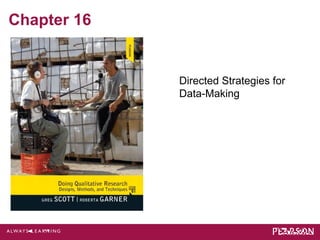More Related Content
Similar to Garner c16
Participative Rural Appraisal,Tools,Techniques Requirements, Scope,Risks, by...Participative Rural Appraisal,Tools,Techniques Requirements, Scope,Risks, by...Sarath Thomas
Similar to Garner c16 (20)
More from Beulah Heights University
More from Beulah Heights University (20)
Garner c16
- 2. Ethnography Essentials: A Brief
Review
• In the course of ethnographic research:
– You may draw upon any combination of the
“tools” presented in this book
• Everything you recall having seen, heard,
felt, tasted, smelled, and touched will be:
– Reduced to handwritten and then typed words
on a page
© 2013 Pearson Education, Inc. All rights reserved.
- 3. Ethnography Essentials: A Brief
Review
• The ethnographer’s ultimate goal is to
generate “an account” of the culture
• The individual cultural insider is not the
primary unit of analysis;
– Rather, the UOA is the culture itself;
• As culture is the outcome of interacting individual
and institutional forces.
© 2013 Pearson Education, Inc. All rights reserved.
- 4. The Directed Strategies
• When Should I Use Directed Strategies?
– Too many ethnographers rely on directed
strategies and techniques only when they:
• Feel they need to test their hypotheses
– Within the culture you’re studying, you’ll be an
outsider
© 2013 Pearson Education, Inc. All rights reserved.
- 5. The Directed Strategies
– Reprioritizing roles
– Directed techniques
• What Do Directed Strategies Produce?
• Asking Questions
– Remember, ask a lot of “how” questions
– Estimation
© 2013 Pearson Education, Inc. All rights reserved.
- 6. The Directed Strategies
– Compare And Contrast
– Baiting
• Processual Interviewing
• Manualize
– Every culture encompasses specific
processes for getting things done
© 2013 Pearson Education, Inc. All rights reserved.
- 7. The Directed Strategies
– A behavioral domain is a kind of collective
“habitus”
• Free-Listing and Pile-Sorting
– Upon first entering a culture, you’ll be ignorant
of many things
– A cultural domain is an area of shared reality
– Doing a free-list with an informant is easy
© 2013 Pearson Education, Inc. All rights reserved.
- 8. The Directed Strategies
• Sociometric Grid Mapping
– A sociometric grid is nothing more than a
table, or matrix
• Daily Diary
– Daily diaries are generally more reliable than
retrospective interviewing
© 2013 Pearson Education, Inc. All rights reserved.
- 9. The Directed Strategies
• Ethnographic Shadowing
– Yields even more nuanced and rich data
– Shadowing can give you a tremendous
amount of data on how:
• Informants view and navigate the world
• Informant Mapping: Individuals and Focus
Groups
© 2013 Pearson Education, Inc. All rights reserved.
- 10. The Directed Strategies
– Will furnish you with data on how they see the
social, natural; and built “ecology” of daily life
• Systematic Social Observation (SSO)
– Gather qualitative & quantitative ethnographic
data on physical and social phenomena in:
• The neighborhood/area that encompasses the
culture you’re studying
© 2013 Pearson Education, Inc. All rights reserved.
